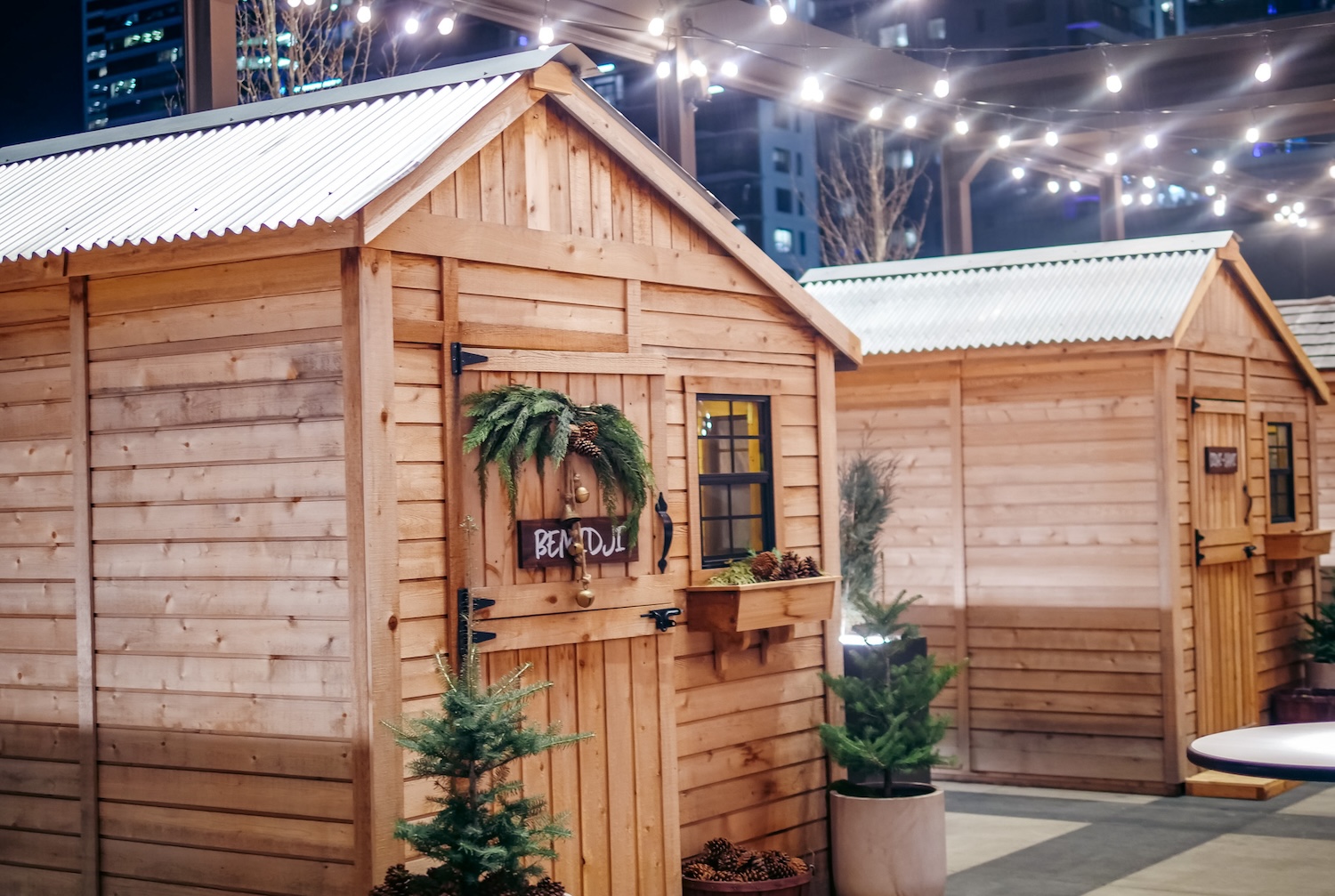NORTH STARS:
Heritage Value
Climate Action
Diversity & Inclusion
“The Great Northern Festival sparks conversation and creates community amidst the coldest and darkest days of Minnesota’s winter.”
“Think of your favorite foods. Now look at the plate in front of you,” said Sam Kass, former Obama White House chef and food policy advisor, to the tables of guests in Hewing Hotel’s Tulibee Restaurant. “If temperatures continue to rise at the current rate, many of these foods won’t be here for your children or grandchildren to eat.”
In front of me sat mussels and oysters on the half shell paired with a glass of Champagne. Seared salmon, Minnesotan wild rice, and wine, among other courses, followed during the Last Supper, a climate-action-focused dining experience. The dinner was part of the 2024 Great Northern Festival, an annual climate-meets-culture-meets- travel festival in the Twin Cities of Minneapolis and St. Paul.
“Food is a powerful tool to understand climate change,” continued Kass, who hosted the experience alongside celebrity chef and Minneapolis resident, Andrew Zimmern.
The Last Supper
Kass held the first Last Supper at COP21 in Paris in 2015 to highlight the realities of climate change in a universal language: food. He continues to host these dinners crafted around endangered foods to tell an intricate and imperative story: a climate-impacted food industry is no longer a theoretical possibility. It is happening now.
Centuries-old Champagne estates in France are investing in land in England. If global temperatures hit the two degrees increase, by 2050, 50% of coffee-growing regions will no longer be viable. Oysters are absorbing a quarter of the carbon in the atmosphere and the shells are becoming too acidic for babies to form. Drying riverbeds are impeding normal cycles of salmon spawning which requires free-flowing rivers.
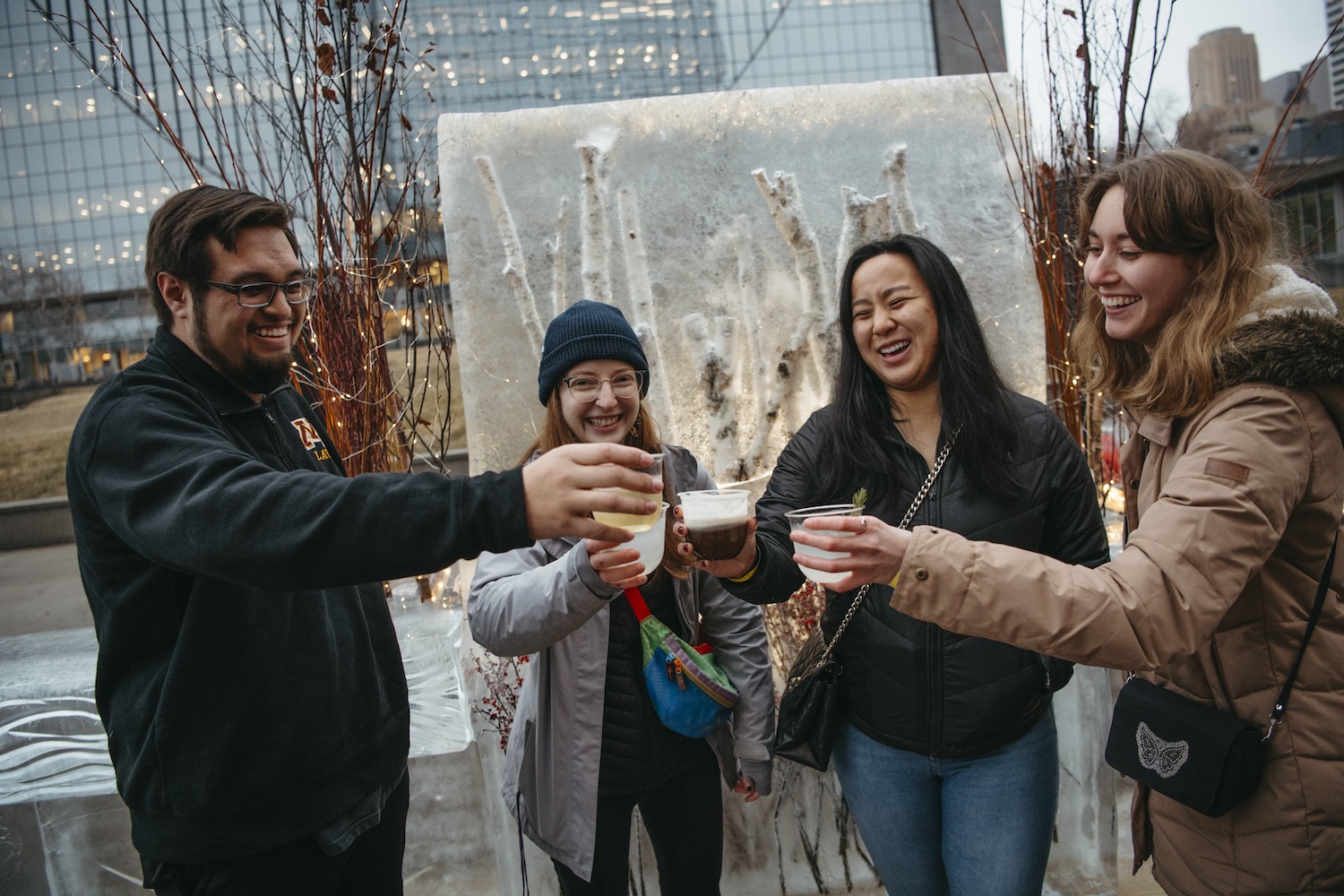
Grabbing a drink at the Ice Bar. Photo Credit_ The Great Northern
Climate change is understandably challenging to grasp. When the concept is a chef-prepared meal featuring everyday ingredients like coffee, wine, shellfish, and chocolate, however, the message becomes easier to grasp. During dessert, Kass and Zimmern opened the room up for questions. Over coffee and chocolate-infused sticky toffee pudding, we dove deep into topics ranging from the future of our food systems, to eating in sync with the seasons, to holding hope despite the uphill challenges we’re facing.
A Celebration of Winter
The Last Supper was just one of many dinners, performances, and exhibits at the 2024 iteration of the Great Northern. The festival unfolds over two weeks in late January and early February at museums, restaurants, hotels, parks, and beyond across Minneapolis and St. Paul. It is a celebration of all things winter — and doubles as a platform for climate action. Each year a new group of artists, musicians, chefs, and climate activists weave an intricate story about the winter season, encouraging participants to embrace the season while reflecting on the future of winters on our warming planet.
The Great Northern sparks conversation and creates community amidst the coldest and darkest days of Minnesota’s lengthy winter. The intentionally curated series strikes a thoughtful balance between finding joy and celebration in winter and Northern cultures, while fostering awareness and inspiring action around climate change.
Attendees can enjoy snowy adventures in an illuminated park at the Midwinter Melt or join Indigenous guides on the “Learning From Place: Bdote,” a guided walk to historically significant sites for the Dakota people. Warm up in one of the dozens of saunas at the Sauna Village, which draws on global sauna traditions to create community and healing. Join dinners across town, which previously have included K’ooben, a pop-up of the Twin Cities’ most celebrated chefs, and the Winter’s Tale, an elaborate Scandinavian-inspired winter dinner.
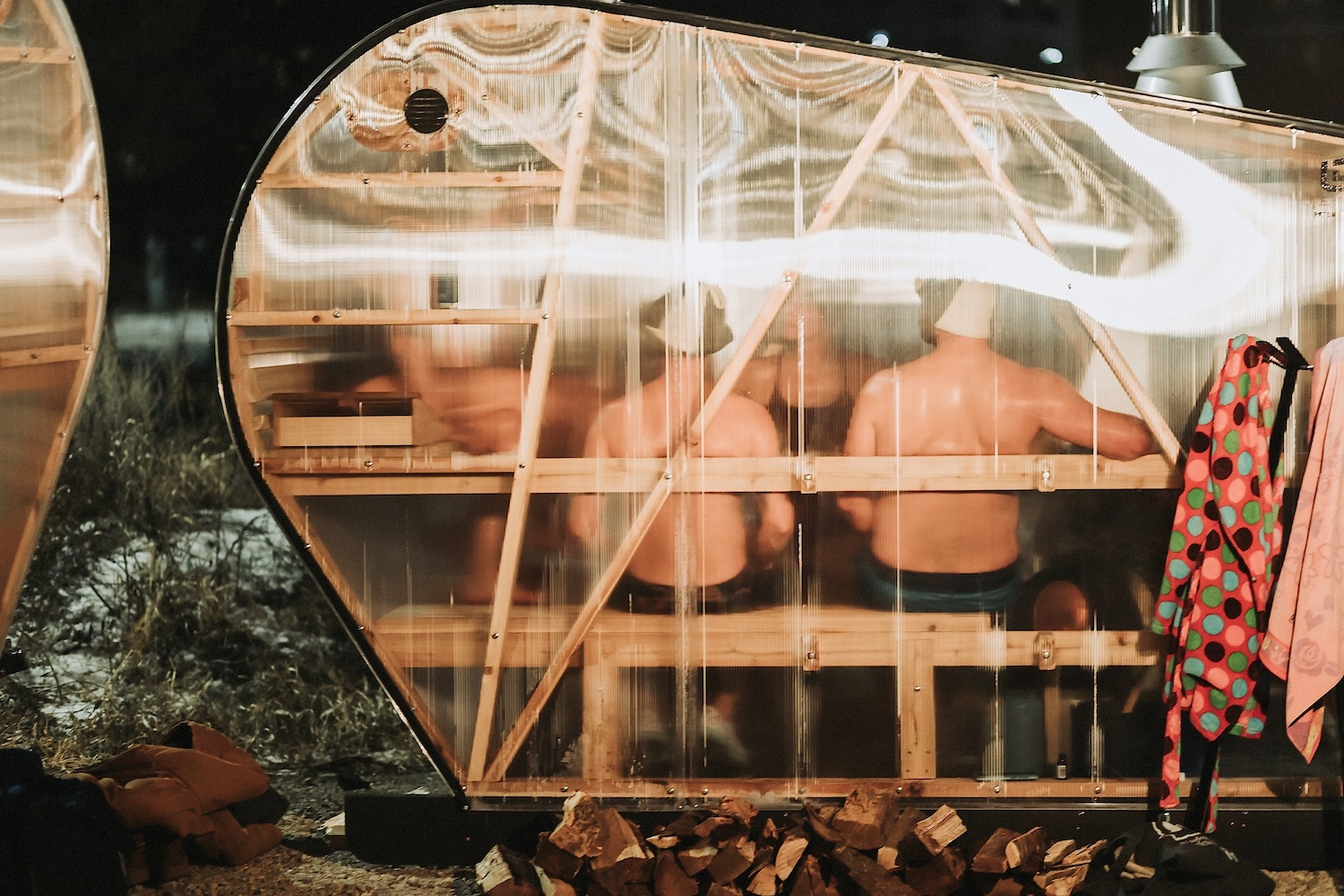
Heating up in the Great Northern Festival’s Sauna Village. Image Courtesy of Jayme Halbritter
On a balmy Saturday evening, I ordered a craft libation from the Great Northern’s Ice Bar — an expansive ice sculpture doubling as a cocktail bar that steadily melted in the uncharacteristically mild January. What might have typically been seen as a failure underscored the entire message of the festival: winters as we know them are in danger. Climate change is knocking at our doors and Northern cultures and communities deeply tied to winter face threats as well.
Sparking Discussion at the Climate Action Series
To deepen the conversations sparked at the events, the festival hosts a Climate Action Series during its first weekend. Over two days, I listened to Chefs Andrew Zimmern and Sam Kass reflect on the future of food systems. I learned about Minnesota climate policy and the local path to carbon neutrality. Professional alpinist and climate activist Graham Zimmerman spoke on the impact of warming winters in mountainous communities like Pakistan and the role professional athletes can play in climate action.
To top off the weekend, renowned outdoors activist and drag queen Pattie Gonia took the stage. “How can we, as a society, operate like a well-nourished meadow?” she asked the packed room. Pattie Gonia’s take-home message was simple: Learn the names of more plants and trees. Familiarize yourself with the feeling of having your hands in the dirt. Spend time more time in nature.
This year, attendees can look forward to annual favorites including cocktail hour at the Ice Bar and steam sessions at the Sauna Village that features forest bathing and guided sauna sessions for the BIPOC community. Among the cultural and climate events is a performance by First Nation Wolastoqiyik singer and composer Jeremey Dutcher, a seminar by the University of Minnesota Climate Adaptation Partnership on preparing for and navigating winters amidst climate change, and a panel on the equitable decarbonization of buildings in the Midwest.
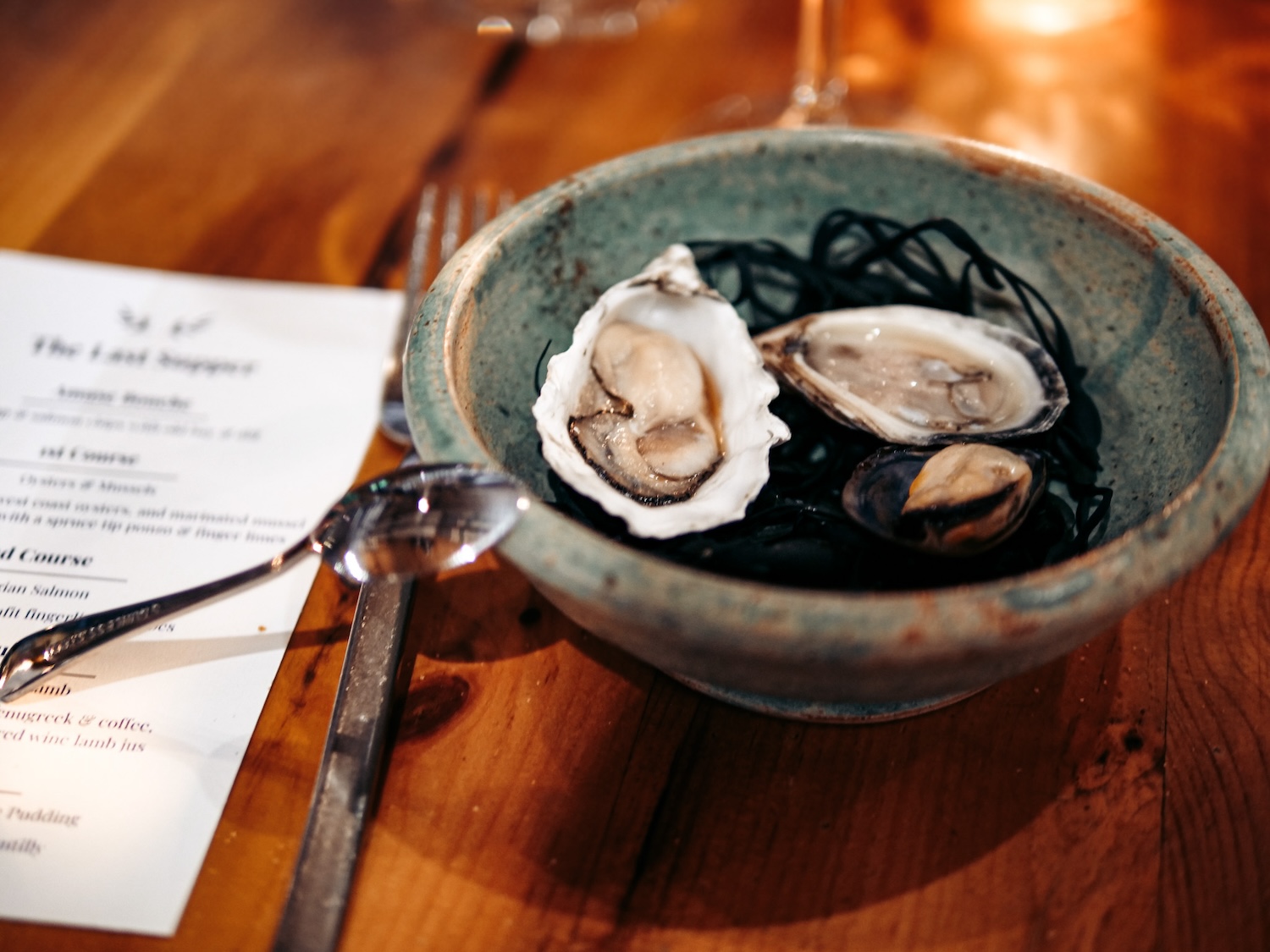
The Great Northern’s dining series features ingredients threatened by climate change. Image Courtesy of Alicia Erickson)
As a longtime skeptic of winter, the Great Northern Festival helped soften me towards the cold, dark season. One such moment that inspired the shift took place at a festival event at the Minneapolis Institute of Art (Mia). I sat in total darkness listening to a violin, recordings of migratory birds, and sound bowls, among other instruments, create an audible experience of a Minnesotan winter night. At the end, musician Ariana Kim reflected on the inspiration for the composition, asking, “With long Minnesotan winters, how can we embrace the dark? We spend so much time in it, how can we shift and deepen and learn from this experience?”
As a proponent of listening to and living in tune with nature, the notion of embracing and learning from even the darkest, most challenging seasons was thought-provoking, which is a perfect echo of the entirety of the festival. I was inspired by the diverse compilation of experiential art, food, and outdoors events, and the many ways in which conversations around climate can be held. The orchestrators of the Great Northern have created a genius blueprint that uses mediums like food and art to make the climate crisis more accessible to the public — and is one that I hope to see reflected more abundantly in festivals and events around the world.
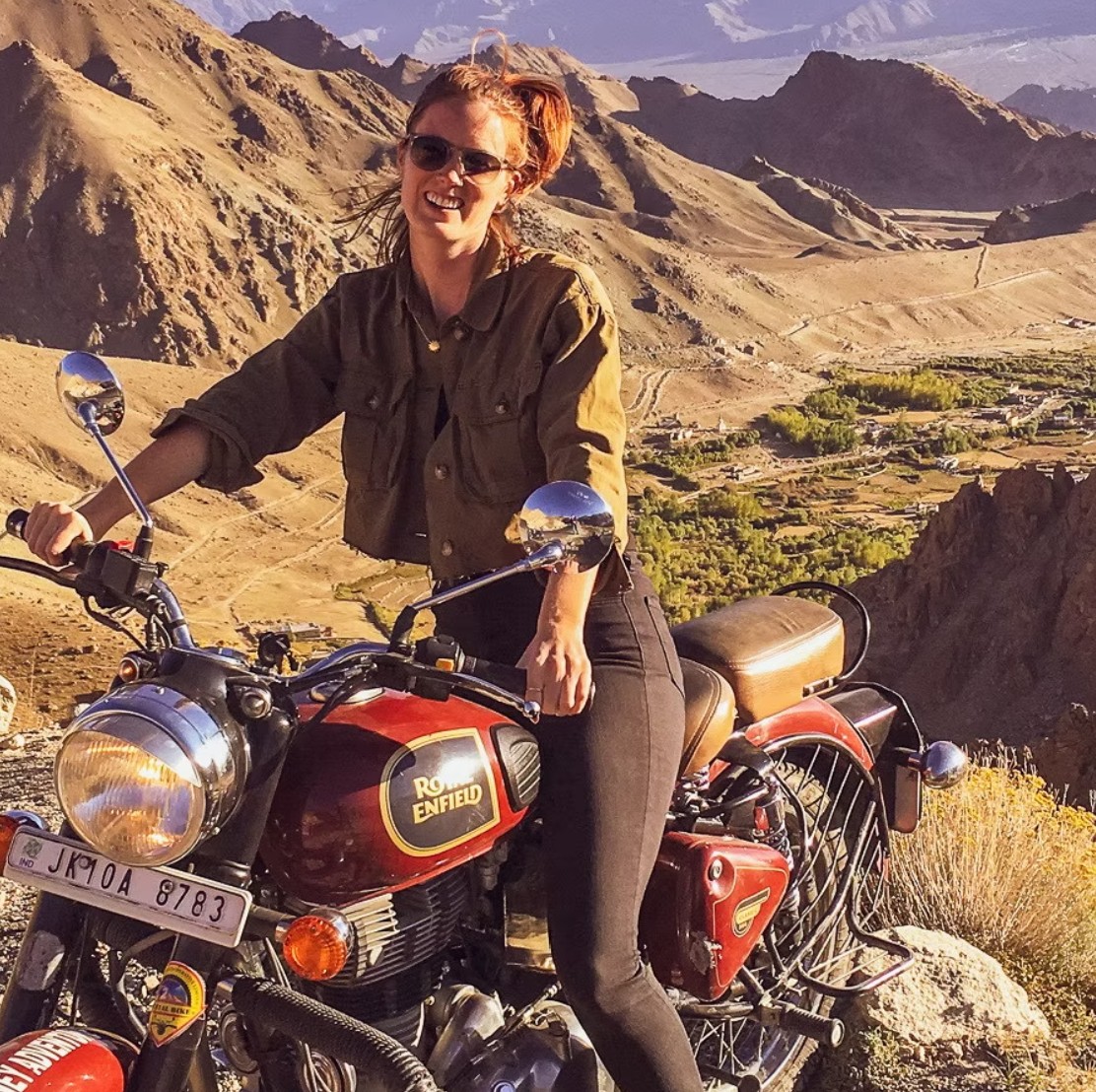
Alicia grew up as a third-culture kid in the Pacific Northwest, Japan, and Europe, where her fascination for the world was born. She has been on the move ever since, chasing her curiosity around the globe. For the last eight years, Alicia has been working as a travel writer for publications like World Nomads, Conde Nast Travel, Seattle Times, and BBC Travel, developing content focused on ethical and sustainable travel, food origins, and outdoor adventures. Follow Alicia on IG @Alicia_Erickson


